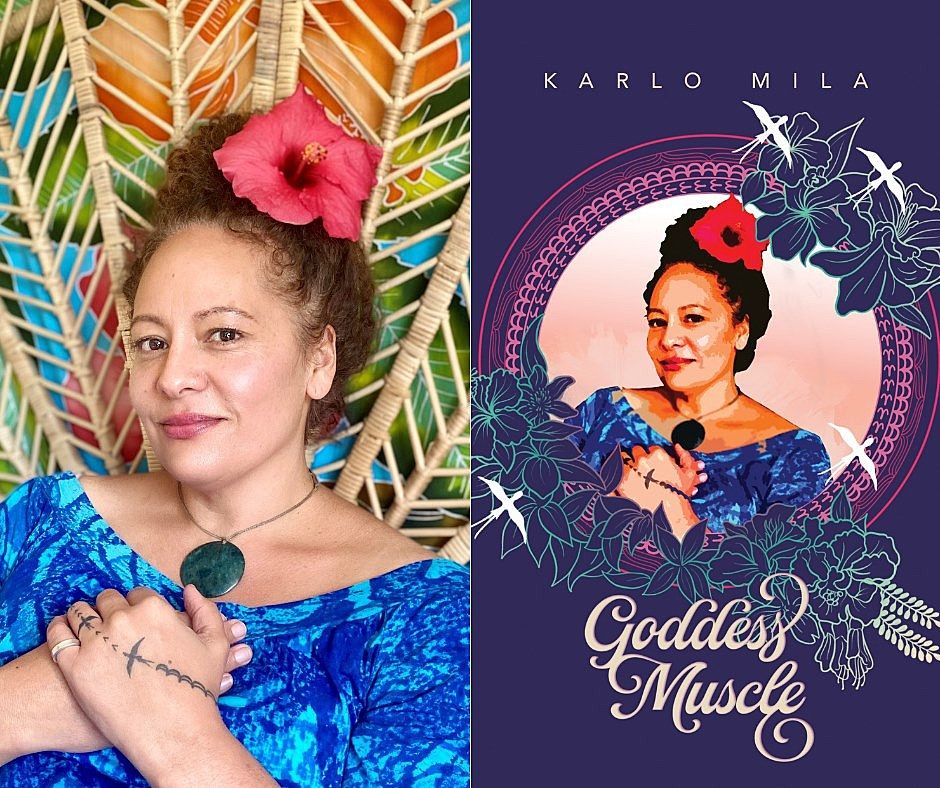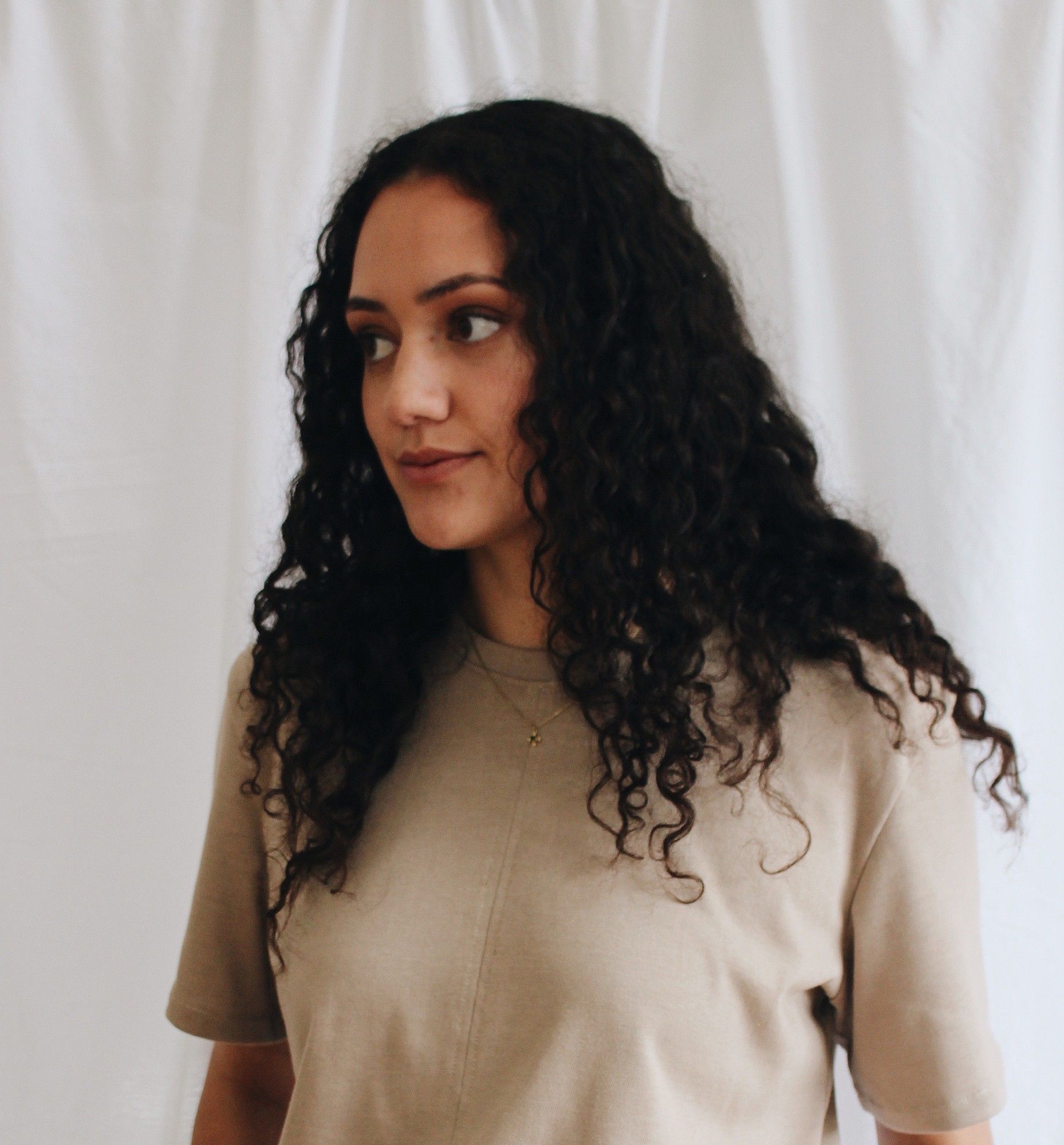The Oceans Within Us: A Review of Goddess Muscle
Rhegan Tu’akoi on memory and home in Karlo Mila’s latest poetry book.
Karlo Mila’s voice washed over the crowd who came for her lunchtime performance at Unity Books on a rainy Wellington day.
We are remembering
all the atua:
earth, sea, skies, trees.
[…]
This is the great remembering.
Some people leaned against walls of books, some sat on the floor and some paced quietly at the back. I remember the tears. Each idea she breathed into the air was met with soft gasps and, often, sobs. It's hard to be unaffected when someone like Mila opens herself up. She performed four poems from Goddess Muscle, one for Tamir Rice, another for all her sisters, one addressed to Jacquie Sturm (not James), and ‘The Good Wife’s Prayer’ as a requested encore. Hearing Mila perform was a better introduction to this book than picking it up and reading it in order. Her voice is lyrical and lush, and I couldn’t take my eyes off her.
The first poem in the book, ‘Your People Will Gather Around You: Love After Love’, is about family and those who have come before, and the way that we are all the products of our ancestors’ dreams. This poem holds out a hand to the reader, offering to take them on a journey of remembering – of who they are, of where their home is and of what their bones are made of.
And then time will come
with great knowing,
when you will remember yourself
back to yourself.
I can pinpoint the moment when I first remembered myself. I was standing in Holonga, my family’s village in Tonga. My ancestors had stood in this very same spot and it was my first time there. The smell of sea salt was strong, and I knew I had been there before. Parts of myself began to weave together and I felt warm and serene – this was the moment of remembering myself back to myself. Reading Mila’s poems helped my bones recollect where they’ve come from. Is that what we are doing, all of us Indigenous peoples, especially those who don’t live on the fonua? Are our bones always remembering?
This whole collection is one of remembering. Like the common Pacific symbol of the spiral, whose structure, as Selina Tusitala Marsh explains, urges “the mind’s eye toward a centre that allows for the possibility of multiple centres; it ‘looks’ back even as it progresses forward.”1 We learn from our ancestors. Their memories help us push through the present.
We will go forward into our past
and bring us back to our future.
Mila offers poems for our ancestors, ensuring the reader (if not familiar) understands the impact of those who have gone before, and the way they continue to influence our lives and our writing. We cannot build the future without the foundations they have laid. My favourite of these were dedicated to Epeli Hau‘ofa and Teresia Teaiwa, two of our greatest thinkers. In memory of the latter, she writes:
The OG feminist:
Dr Dusky Maiden,
who famously
cried salt-tears
and sweat ocean,
creating a wake
wide enough
for so many of us
who followed.
Although many of these poems brim with ‘ofa and immerse the reader in the warm, soothing ocean, Mila does not shy away from the realities of being Pacific in a colonial-settler state like New Zealand. In ‘We Find Ourselves Statistics’ she breaks down the way numbers lie about Indigenous peoples, but are accepted as fact, regardless.
Even numbers are rarely even.
We find ourselves on odd un-level playing fields
There’s also a stunning poem for Ihumātao, both hilarious and heartbreaking – imagining Jacinda actually visiting the whenua in expensive gumboots and a red cape; and remembering the ancestors who gave up all they had. It is also a mihi to current protectors and to the whenua. About the latter, Mila writes:
Once you know it,
you cannot unknow it.
We do not hurt the things we love.
I cried as Mila performed her poems at Unity Books because her words explain my bones better than I ever could. This collection made me feel like I was coming home, and it gave me a more rounded understanding of the push and pull of my Tongan and Pākehā identities. Mila makes it so special to not only be Pacific, but to be specifically Tongan. While reading this collection, I recognised the ocean within her and the way it is within me, too.
I see Mila as an elder, a guardian of our literature, a speaker and keeper of our words. When I met her afterwards, all I managed to say was “Thank you. My mum loves you! Can you please sign this for her? Thank you.” What I meant was thank you for being brown, having curly hair like mine and being a goddess poet. Thank you for holding space. How was I meant to put all this ‘ofa into something I could say?
Mālō Karlo for the words, and for opening yourself in a way only poets can. Mālō for flexing your goddess muscle. I only hope that one day I can too.
1 Selina Tusitala Marsh, “Theory ‘versus’ Pacific Islands Writing,” in Inside Out: Literature, Cultural Politics, and Identity in the New Pacific, ed. Vilsoni Hereniko and Rob Wilson (Lanham, MD: Rowman & Littlfield, 1999), 337-356.

